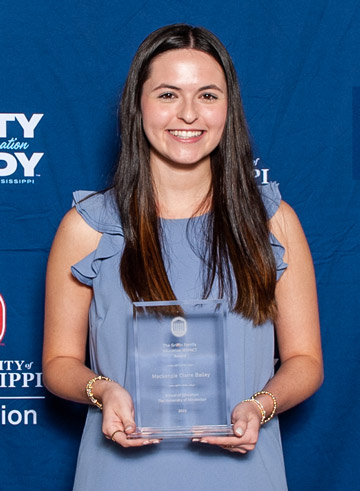Elementary Education, B.A.Ed.
Help young students develop the academic and social skills they need to build a strong foundation for future learning.

About the B.A.Ed. in Elementary Education
Students who pursue a B.A.Ed in Elementary Education tailor their degree to their interests by choosing two concentration areas. Students may choose from the subjects of English, math, science, social studies, fine arts, foreign language and/or computer science.
- All students who pursue Elementary Education at UM also receive a Special Education Endorsement, which bolsters teachers' ability to serve all students. Many students opt to pursue additional endorsements in areas of health, computer applications, ESL, and more!
- The 124-hour program is approved for a K-6 license in Elementary Education and a K-12 license in Mild/Moderate Disabilities.
There are three phases for education majors: Phase I: Core Curriculum; Phase II: Teacher Education Program; and Phase III: Student Teaching.
- During Phase III, our teacher candidates observe and teach alongside talented local teachers. In the classroom, students learn effective teaching methods, how to cater to students of different grades and developmental levels, and how to develop a professional disposition.
The Student Advising and Field Experience (SAFE) office works with school partners in establishing placement for these observations.
On this Page…
Explore Everything the B.A.Ed. in Elementary Education has to Offer
Applicants to the program must meet these requirements:
- 2.5 grade point average (entry admission for transfer students and change of major)
- 2.75 grade point average (admission for Phase II: Teacher Education Program) and appropriate scores on either the ACT, SAT or Praxis CORE* (link to Phase II information is posted above under Program Description)
*Praxis Core Exemption: Students are exempt from taking the Praxis CORE exam for admission to Phase II if they:
- Provide proof of an ACT score of at least a 21 composite (or SAT equivalent; View the SAT Equivalency Scoring sheet for more information) OR
- Have a cumulative GPA of 3.0 or higher on a minimum of 60 hours of completed coursework
Candidates in the teacher education program begin field placements in their sophomore and/or junior year.
- These placements are tied to courses and have a minimum number of hours required which candidates fulfill by the end of the semester as stated in the course syllabus.
- Candidates are paired with Clinical Instructors.
Course instructors provide guidelines to the candidates as to how the field placement should be completed. University Ssupervisors are not assigned to these placements.
METP 101, 102, 201, 202 – 10 hours for each course.
Courses with Field Experiences
EDCI 352 – Education, Society, and the K-12 Learner
(Early Childhood, Elementary, Health and Physical Education, Secondary, and Special Education)
- Field-based Assignments for EDCI 352: TeachLive Virtual Field Experience
EDCI 353 - Planning and Teaching Strategies for Effective Classroom Practice. (Early Childhood, Elementary, Health and Physical Education, Secondary, and Special Education)
- Field-based Assignments for EDCI 353:
- 25 hours in assigned classroom
- 1 Scheduled TeachLive ssession
- Prepare a written unit plan
- Assist the supervising teacher
- Teach one or more lessons
EDEC 321 - Child Development Classroom observation (10 hours) paper
- The students will need to:
- Observe children in an early childhood education center
- Record what they observed about the children in each observation (day and time), and
- Interpret the information they collected in light of what is covered so far in the class. This part of their paper should include a discussion of some aspect of children's development (e.g., social, physical, moral, etc.) is addressed in the readings. Relate their observations to at least one of the theories/concepts/terms that is discussed in class.
- Reflect on what they learned as they type a brief reflection paper. How is this useful to their understanding of child’s development? How might this information influence their professional practices?
EDRD 355 - Early Literacy Instruction (Early Childhood, Elementary & Special Education)
- Field-based Assignments for EDRD 355:
- 16 hours in the classroom
- Focused literacy observation as designated and planned by the course instructor
EDRD 400 - Reading Instruction (Elementary and Special Education)
- Field-based Assignments for EDRD 400:
- 5 hours in the classroom
- Open Response Comprehension Assessment Assignment
EDSP 327 - Classroom and Behavior Management (Early Childhood, Elementary, Health and Physical Education, Secondary, and Special Education)
- Field-based Assignments for EDSP 327:
- 10 hours designed by course instructor (Note:15 hours for Honors/METP)
- Field-based Assignments for EDSP 407:
- 5 hours in classroom
- Observation
- Teacher Interview
EDSP 410 - Effective Instruction for Teaching in Inclusive Settings (Early Childhood, Elementary and Special Education) – this moves to EDSP 452 for SPED Majors
- Field-based Assignments for EDSP 410:
- 10 hours in classroom (elementary majors)
- Observation
- Unit Planning and Implementation
All teacher education candidates in the elementary, health and physical education, secondary, and special education programs are placed in one location during the senior year.
- The yearlong internship consists of senior practicum and student teaching.
- Candidates are paired with the same Clinical Instructor for the entire senior year.
All senior yearlong placements are overseen by a Uuniversity Ssupervisor and are based on the Interstate Teacher Assessment and Support Consortium Standards (InTASC) and Special Professional Association (SPA) Standards.
Senior Practicum - Elementary
EDLE 417 – Senior Practicum
During the first semester of an elementary education teacher candidate’s senior year, the candidates will participate in EDLE 417- Senior Practicum, which includes a field experience two days each week.
- Candidates will also attend university classes as scheduled each week (EDEL 401, EDEL 402, EDEL 403, EDEL 404, and EDRD 414).
Field Experience for EDLE 417
Two (2) days in classroom (NPS site) each week (Monday and Wednesday)
- Develop a written unit plan showing plan for differentiation and inclusive settings (EDSP410).
- Teach at least 1 lesson observed and evaluated by University Supervisor
- Assist with small group instruction
- Assist whole class instruction
- Assist classroom teacher
Student teaching in the State of Mississippi, as required by law, must be a full-time assignment for a minimum of twelve weeks. In the teacher education program described below, teacher education candidates are assigned to public schools for one full semester, which exceeds the minimum time required by law. Teacher education candidates will be working with a selected Clinical Instructor five days-a-week and will receive 9 hours credit for the student teaching experience.
Except for music education majors, placement for student teaching is in the same classroom as for senior practicum. Candidates majoring in elementary education are placed in grades K-6, and candidates majoring in secondary education are placed in grades 7-12. Candidates majoring in special education and music education are placed in grades K- 12. All junior and senior placements are coordinated through the SAFE office to ensure that candidates have diverse experiences throughout their teacher education program.
Only in extreme circumstances will a student teaching placement other than those listed above be considered. Candidates must submit to the SAFE office a written request, detailing reasons for the request, for placement exceptions six weeks prior to student teaching.
All candidates must enroll in EDCI 419 Classroom Assessment simultaneously with student teaching.
Requirements for Student Teaching
In order to be admitted to student teaching, a candidate must meet the following requirements:
Admission to the Phase II: Professional EducationCore
A minimum grade of “C” in professional education courses. If this minimum of “C” is not met, the course(s) must be retaken before enrolling in the next level of professional education courses
A minimum grade of “C” in content and related fields (secondary majors) and general education courses (early childhood, elementary, health and physical education, and special education majors).
Completion of all core and professional education courses
Completion of teaching and field experience courses (content and related field experiences courses). Completion of 15 hours in residency at The University of Mississippi (includes Tupelo, Desoto, Grenada, and Booneville campus centers). Note: Completion of 30 hours in residency is required for graduation
Completion of courses taken by correspondence for admission to student teaching (grade must be on file prior to admission)
Evidence of professional liability insurance
Evidence of a successful background check
During the student teaching semester candidates are required to enroll in 9 semester hours of student teaching and 3 hours of classroom management (EDCI 419). Only one additional (3-4 hour) elective course is allowed, restricting students to a maximum of 15-16 hours during the student teaching semester. This maximum number of hours may not include courses in the general or content related fields.
Find Courses in Elementary Education
Want to learn more?
We're glad your interested in our program! If you'd like to chat or just need more information, don't hesitate to reach out.
Sam Gilbert
Clinical Assistant Professor of Teacher Education

Here's what folks have to say about our graduates
"Mackenzie shows her students that she cares about them as a complete person and not just as a grade."
Mackenzie Bailey
2023 Griffin IMPACT Award Winner
Next Steps
Explore Affordability
We have a variety of scholarships and financial aid options to help make college more affordable for you and your family.
Apply to the University of Mississippi
Are you ready to take the next step toward building your legacy?
